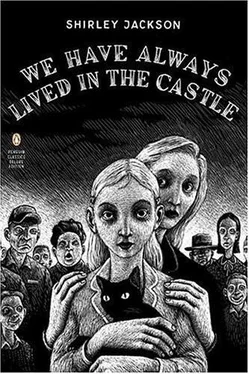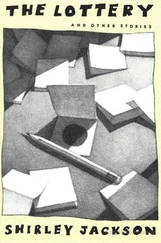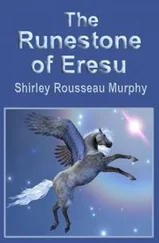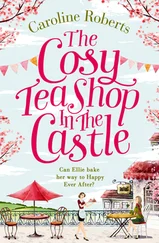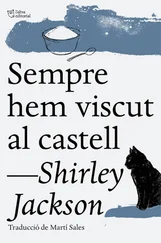Shirley Jackson - We Have Always Lived in the Castle
Здесь есть возможность читать онлайн «Shirley Jackson - We Have Always Lived in the Castle» весь текст электронной книги совершенно бесплатно (целиком полную версию без сокращений). В некоторых случаях можно слушать аудио, скачать через торрент в формате fb2 и присутствует краткое содержание. Город: New York, Год выпуска: 2006, ISBN: 2006, Издательство: Penguin Books, Жанр: Триллер, gothic_novel, на английском языке. Описание произведения, (предисловие) а так же отзывы посетителей доступны на портале библиотеки ЛибКат.
- Название:We Have Always Lived in the Castle
- Автор:
- Издательство:Penguin Books
- Жанр:
- Год:2006
- Город:New York
- ISBN:978-1-101-53065-8
- Рейтинг книги:3 / 5. Голосов: 1
-
Избранное:Добавить в избранное
- Отзывы:
-
Ваша оценка:
- 60
- 1
- 2
- 3
- 4
- 5
We Have Always Lived in the Castle: краткое содержание, описание и аннотация
Предлагаем к чтению аннотацию, описание, краткое содержание или предисловие (зависит от того, что написал сам автор книги «We Have Always Lived in the Castle»). Если вы не нашли необходимую информацию о книге — напишите в комментариях, мы постараемся отыскать её.
is a deliciously unsettling novel about a perverse, isolated, and possibly murderous family and the struggle that ensues when a cousin arrives at their estate.
We Have Always Lived in the Castle — читать онлайн бесплатно полную книгу (весь текст) целиком
Ниже представлен текст книги, разбитый по страницам. Система сохранения места последней прочитанной страницы, позволяет с удобством читать онлайн бесплатно книгу «We Have Always Lived in the Castle», без необходимости каждый раз заново искать на чём Вы остановились. Поставьте закладку, и сможете в любой момент перейти на страницу, на которой закончили чтение.
Интервал:
Закладка:
“You look well, Constance. Have you been working in the garden?”
“I couldn’t help it, on a day like this.” Constance laughed; she was doing very well. “It’s so exciting,” she said across to Mrs. Wright. “Perhaps you’re a gardener, too? These first bright days are so exciting for a gardener.”
She was talking a little too much and a little too fast, but no one noticed it except me.
“I do love a garden,” Mrs. Wright said in a little burst. “I do so love a garden.”
“How is Julian?” Helen Clarke asked before Mrs. Wright had quite finished speaking. “How is old Julian?”
“Very well, thank you. He is expecting to join us for a cup of tea this afternoon.”
“Have you met Julian Blackwood?” Helen Clarke asked Mrs. Wright, and Mrs. Wright, shaking her head, began, “I would love to meet him, of course; I have heard so much—” and stopped.
“He’s a touch… eccentric,” Helen Clarke said, smiling at Constance as though it had been a secret until now. I was thinking that if eccentric meant, as the dictionary said it did, deviating from regularity, it was Helen Clarke who was far more eccentric than Uncle Julian, with her awkward movements and her unexpected questions, and her bringing strangers here to tea; Uncle Julian lived smoothly, in a perfectly planned pattern, rounded and sleek. She ought not to call people things they’re not, I thought, remembering that I was to be kinder to Uncle Julian.
“Constance, you’ve always been one of my closest friends,” she was saying now, and I wondered at her; she really could not see how Constance withdrew from such words. “I’m going to give you just a word of advice, and remember, it comes from a friend.”
I must have known what she was going to say, because I was chilled; all this day had been building up to what Helen Clarke was going to say right now. I sat low in my chair and looked hard at Constance, wanting her to get up and run away, wanting her not to hear what was just about to be said, but Helen Clarke went on, “It’s spring, you’re young, you’re lovely, you have a right to be happy. Come back into the world.”
Once, even a month ago when it was still winter, words like that would have made Constance draw back and run away; now, I saw that she was listening and smiling, although she shook her head.
“You’ve done penance long enough,” Helen Clarke said.
“I would so like to give a little luncheon—” Mrs. Wright began.
“You’ve forgotten the milk; I’ll get it.” I stood up and spoke directly to Constance and she looked around at me, almost surprised.
“Thank you, dear,” she said.
I went out of the drawing room and into the hall and started toward the kitchen; this morning the kitchen had been bright and happy and now, chilled, I saw that it was dreary. Constance had looked as though suddenly, after all this time of refusing and denying, she had come to see that it might be possible, after all, to go outside. I realized now that this was the third time in one day that the subject had been touched, and three times makes it real. I could not breathe; I was tied with wire, and my head was huge and going to explode; I ran to the back door and opened it to breathe. I wanted to run; if I could have run to the end of our land and back I would have been all right, but Constance was alone with them in the drawing room and I had to hurry back. I had to content myself with smashing the milk pitcher which waited on the table; it had been our mother’s and I left the pieces on the floor so Constance would see them. I took down the second-best milk pitcher, which did not match the cups; I was allowed to pour milk, so I filled it and took it to the drawing room.
“—do with Mary Katherine?” Constance was saying, and then she turned and smiled at me in the doorway. “Thank you, dear,” she said, and glanced at the milk pitcher and at me. “Thank you,” she said again, and I put the pitcher down on the tray.
“Not too much at first,” Helen Clarke said. “That would look odd, I grant you. But a call or two on old friends, perhaps a day in the city shopping—no one would recognize you in the city, you know.”
“A little luncheon?” Mrs. Wright said hopefully.
“I’ll have to think.” Constance made a little, laughing, bewildered gesture, and Helen Clarke nodded.
“You’ll need some clothes,” she said.
I came from my place in the corner to take a cup of tea from Constance and carry it over to Mrs. Wright, whose hand trembled when she took it. “Thank you, my dear,” she said. I could see the tea trembling in the cup; it was only her second visit here, after all.
“Sugar?” I asked her; I couldn’t help it, and besides, it was polite.
“Oh, no,” she said. “No, thank you. No sugar.”
I thought, looking at her, that she had dressed to come here today; Constance and I never wore black but Mrs. Wright had perhaps thought it was appropriate, and today she wore a plain black dress with a necklace of pearls. She had worn black the other time, too, I recalled; always in good taste, I thought, except in our mother’s drawing room. I went back to Constance and took up the plate of rum cakes and brought them to Mrs. Wright; that was not kind either, and she should have had the sandwiches first, but I wanted her to be unhappy, dressed in black in our mother’s drawing room. “My sister made these this morning,” I said.
“Thank you,” she said. Her hand hesitated over the plate and then she took a rum cake and set it carefully on the edge of her saucer. I thought that Mrs. Wright was being almost hysterically polite, and I said, “Do take two. Everything my sister cooks is delicious.”
“No,” she said. “Oh, no. Thank you.”
Helen Clarke was eating sandwiches, reaching down past Constance to take one after another. She wouldn’t behave like this anywhere else, I thought, only here. She never cares what Constance thinks or I think of her manners; she only supposes we are so very glad to see her. Go away, I told her in my mind. Go away, go away. I wondered if Helen Clarke saved particular costumes for her visits to our house. “This,” I could imagine her saying, turning out her closet, “no sense in throwing this away, I can keep it for visiting dear Constance.” I began dressing Helen Clarke in my mind, putting her in a bathing suit on a snow bank, setting her high in the hard branches of a tree in a dress of flimsy pink ruffles that caught and pulled and tore; she was tangled in the tree and screaming and I almost laughed.
“Why not ask some people here?” Helen Clarke was saying to Constance. “A few old friends—there are many people who have wanted to keep in touch with you, Constance dear—a few old friends some evening. For dinner? No,” she said, “perhaps not for dinner. Perhaps not, not at first.”
“I myself—” Mrs. Wright began again; she had set her cup of tea and the little rum cake carefully on the table next to her.
“Although why not for dinner?” Helen Clarke said. “After all, you have to take the plunge sometime.”
I was going to have to say something. Constance was not looking at me, but only at Helen Clarke. “Why not invite some good people from the village?” I asked loudly.
“Good heavens, Mary Katherine,” Helen Clarke said. “You really startled me.” She laughed. “I don’t recall that the Blackwoods ever mingled socially with the villagers,” she said.
“They hate us,” I said.
“ I don’t listen to their gossip, and I hope you don’t. And, Mary Katherine, you know as well as I do that nine-tenths of that feeling is nothing but your imagination, and if you’d go halfway to be friendly there’d never be a word said against you. Good heavens. I grant you there might have been a little feeling once, but on your side it’s just been exaggerated out of all proportion.”
Читать дальшеИнтервал:
Закладка:
Похожие книги на «We Have Always Lived in the Castle»
Представляем Вашему вниманию похожие книги на «We Have Always Lived in the Castle» списком для выбора. Мы отобрали схожую по названию и смыслу литературу в надежде предоставить читателям больше вариантов отыскать новые, интересные, ещё непрочитанные произведения.
Обсуждение, отзывы о книге «We Have Always Lived in the Castle» и просто собственные мнения читателей. Оставьте ваши комментарии, напишите, что Вы думаете о произведении, его смысле или главных героях. Укажите что конкретно понравилось, а что нет, и почему Вы так считаете.
